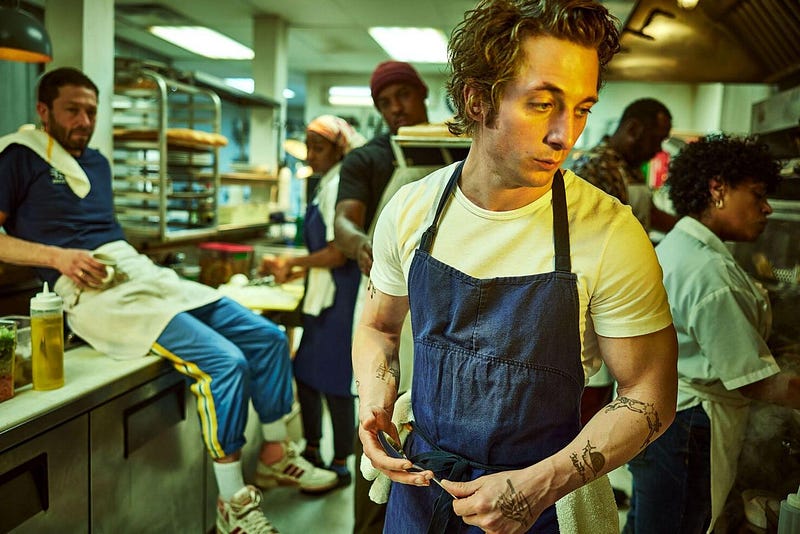
Carmy’s life is turned upside down when he inherits a failing restaurant. Photo courtesy of HITC.com
With a whopping 100% on Rotten Tomatoes, the Hulu comedy-drama
The Bear
by Christopher Storer, notable for
Ramy
and
Eighth Grade
, has taken over screens with its fast-paced narrative of behind-the-scenes action of a family-run Chicago restaurant. Viewers are almost literally thrown into the action of the kitchen of The Original Beef of Chicagoland, where we meet award-winning chef Carmen ‘Carmy’ Berzatto, played by Jeremy Allan White, notable for his long stint on Shameless as the troubled but genius Lip, attempting to commandeer a kitchen of cooks and dishwashers. Because his brother commits suicide and leaves him the restaurant, Carmy must leave his position at the number-one restaurant in the world to run this family restaurant, in spite of all of the politics and trauma it holds.
The first episode begins with no introduction or context. Instead, we are thrust headfirst into the chaos behind the closed double doors of the kitchen. As we watch the unruly food prep unfold and experience the kitchen arguments, we are introduced to ambitious new sous chef Sydney Adamu, played by the comedian/writer Ayo Edebiri. She has an awkward sense of humor, leading viewers to wonder when she is making a joke or merely snapping back. In a show where there are few likable characters, Sydney makes herself endearing through her slights at Carmy and her work ethic in the kitchen. She ultimately proves to be a necessary addition to the lineup, without whom The Original Beef would fall apart.
Throughout the show, viewers have the comfort of seeing the same characters even though every episode seemingly begins and ends disconnected from the one before. Each episode almost feels like you just walked into your friend’s house and their parents are fighting, except you are unsure if you should leave or just watch. The show brings together the high-functioning and traumatized Carmy, the determined and driven Sydney, the hardworking and inspired baker Marcus, the quick-tongued and stubborn Tina, the mellow and grounded Ebraheim and the offensive and disorganized Richie, more commonly referred to as “Cousin.” Somehow, despite all of these strong personalities, it works.
Behind the scenes, the cast was trained by real chefs so they could accurately portray their roles, learning now to create the show’s viral family meal spaghetti and the Chicago-style Italian beef sandwich. Every episode has real food being prepared, so through the stressful experience of getting through the show, your appetite can be quenched. But unlike any restaurant have ever been to, there is a gun fired in one episode and another where Richie is stabbed in the butt.
Unlike other chef-focused television shows,
The Bear
focuses on the failures of masculinity in male-dominated fields.
The Atlantic
poses the question of whether “the show’s larger philosophical concern is whether this universe will ultimately turn out to be Richie’s or Sydney’s to claim.” Richie upholds the toxic male stereotypes that The Original Beef carry, with video games named Ballbreaker and kitchen language that is demeaning. Sydney plays his opposite, a powerful young woman who understands how to handle conflict through food instead of violence and run the restaurant with order.
The series overall theme encompasses the impact of suicide and the trauma it leaves behind. We get a look into Carmy’s own psyche–from him sleep-fire starting to attending his first Al-Anon group meeting. It’s heartbreaking to watch Carmy put himself in his brother’s shoes in an attempt to figure out what led to Mikey to take his life. The show is heavy and makes you feel a lot. Sometimes it makes you feel too much and can be hard to watch, but the beauty of it is the pain the characters feel and how through their hard shells, they are all carrying the same weight on their shoulders. While watching there were moments when one just wants them to all sit in a circle and cry together. It feels like that would have made things move more smoothly somehow.
The finale, which has been acclaimed for White’s seven minute monologue, exposes all the things going on in Carmy’s head after his brother’s death. Stepping outside the kitchen we see Carmy in a Al-Anon meeting, finally taking the spotlight and vocalizing the pain, the frustration, and the hope he feels and has felt. You learn the most about the mysterious Mikey as Carmy discusses their rocky and tumultuous relationship and the guilt he has carried from his absence. It feels almost magical and surreal, as if through so much ambiguity, we finally can visualize a relationship. That doesn’t mean the show ends with all the answers. Though the saturation is lifted in the final episode, Carmy’s turmoil and pain still remain. We feel some relief from his confession but are still weighed down by all of the unknowns left.
What makes
The Bear
different from, other series out right now is how it is the absolute antithesis of comfort television. From the traditional kitchen commands such as “Yes Chef”and “Heard”, the course language and the fast paced chaos the show manages to encompass, it makes you feel like you accidentally walked to the back of a restaurant. The show never has a second of peace, as there is so much yelling, grief, dry jokes, violence, and an eerie filter that makes the skin crawl. But that’s why the show is so successful. It does not act the way you want or expect it to. As
The Rolling Stone
describes it,
The Bear
“is the most stressful thing on TV right now” but “it’s also great”. The show seems to echo Anthony Bourdain’s
Kitchen Confidential
, which is perhaps why it is so popular. It paints an honest, raw, and unforgiving picture of the restaurant business. Viewers can feel the discomfort and stress emanating from the actors when things go wrong, because let’s face it: in a kitchen, they often do.
















